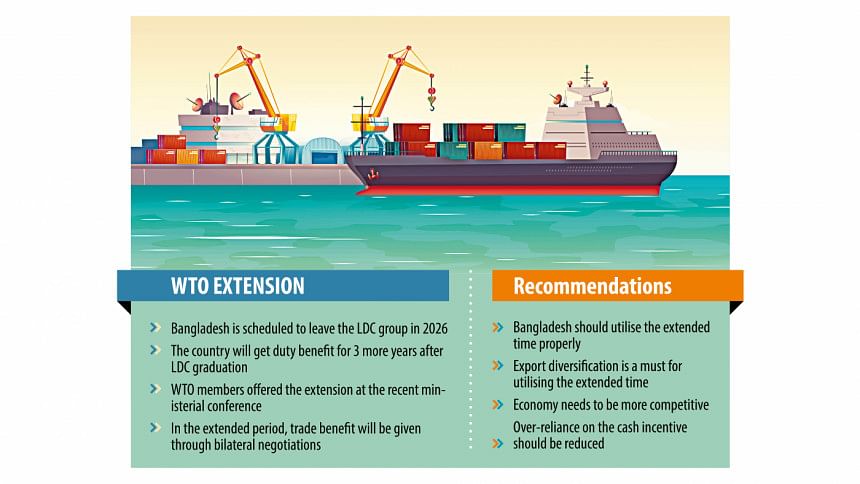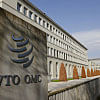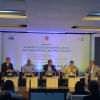Make most of LDC-linked duty benefits during extended period

Bangladesh should make the most of the LDC-linked trade benefits during the extended three-year period agreed by the member countries of the World Trade Organisation (WTO), said experts yesterday.
"The country will have to take full advantage of the extension," said Debapriya Bhattacharya, a distinguished fellow of the Centre for Policy Dialogue (CPD).
But it will not happen if Bangladesh sticks to the old ways of doing things, he said.
Bhattacharya was speaking at a dialogue on "What did WTO-MC13 Deliver for the Graduating LDCs? Perspectives from Bangladesh" at the Cirdap in Dhaka.
The think-tank organised the discussion in partnership with Friedrich-Ebert-Stiftung (FES) Bangladesh where the state minister for commerce, economists, trade analysts, diplomats, government high-ups and researchers spoke.
Last month, the members of the intergovernmental body agreed, at the 13th Ministerial Conference in Abu Dhabi, to continue the trade benefits for graduating least-developed countries (LDCs) for three years following their graduation.
As a result, Bangladesh will continue to enjoy the duty-free market access after becoming a developing nation in 2026.
Various assessments showed that all 45 LDCs will incur a trade loss of $2.5 billion due to the erosion of preference. Of the sum, 80 percent will be lost by Bangladesh, said Bhattacharya.
This is because Bangladesh is a top user of duty benefits among the LDCs, accounting for up to 67 percent of the trade privileges. And more than 73 percent of the country's exports enjoy the facility.
"Bangladesh will have to think about how this loss can be offset by achieving structural transformation and holding on to the preference. The real magic is a much more diversified, productive and competitive economy," Bhattacharya said.
The issue is how to make a transformed, diversified and competitive economy, he said.
"If those are not done, it will become an incentive-addicted economy."
Bhattacharya questioned whether the export sector will get more protection than the domestic economy.
"The three years should be used to move from the defensive approach to a much more proactive approach in order to create a diversified and competitive economy."
He thinks Bangladesh should reduce its over-dependence on garment items since there is a risk if exports are not diversified.
Angola was recommended for LDC graduation 10 years ago, but it is yet to make the transition because of the fall of the oil price.
"This happened because Angola was over-reliant on a single export item and that is fuel. When the fuel price crashed, Angola's economy also crashed," Bhattacharya said.
Garments account for 85 percent of Bangladesh's national exports.
Senior Commerce Secretary Tapan Kanti Ghosh described the MC13 as successful for the graduating LDCs, including Bangladesh, as the ministers approved the three-year extension.
"Bangladesh needs to utilise the extended period fruitfully and a national committee is working on sustainable LDC graduation."
While presenting the keynote paper, Mustafizur Rahman, another distinguished fellow of the CPD, also termed the three-year extension as a positive news for Bangladesh.
"This is because for relatively weaker economies, a rules-based, multilateral trading system, sensitive to developmental dimensions of trade, serves their interests and addresses their concerns best."
Although the MC13 did not meet the expectations of the graduating LDCs fully, the decisions contain several paragraphs that mention, and to some extent address, the special needs of the graduating LDCs, Rahman said.
The decision with regard to market access preferences for graduating LDCs opens the door to the preferential benefit beyond graduation, he added.
"Continuation of preferential access will need to be negotiated bilaterally with preference-offering countries."
State Minister for Commerce Ahsanul Islam Titu said the government is working to diversify exports by raising shipments of jute and jute goods, pharmaceuticals, leather goods and handicraft items.

 For all latest news, follow The Daily Star's Google News channel.
For all latest news, follow The Daily Star's Google News channel. 








Comments